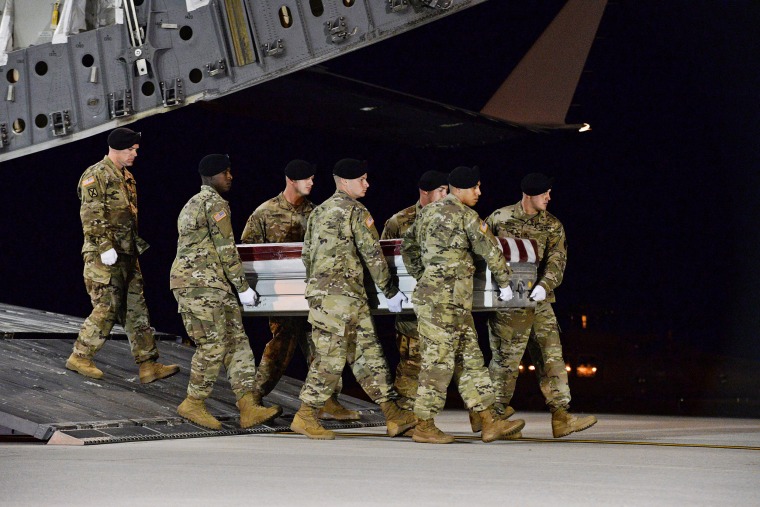The cost of an October 2017 battle between U.S. soldiers and ISIS fighters in Niger was high: Four Americans were killed and two were wounded.
But, as they fought for their lives, none of the soldiers were receiving hostile fire pay.
U.S. service members deployed to Niger do not receive the additional $225 per month in pay that their counterparts in Iraq, Afghanistan, Somalia, and other dangerous environments earn.
“Currently, Niger is not eligible for Imminent Danger Pay (IDP) meaning that any U.S. service member of official duty in Niger during the month of October 2017 were not authorized IDP,” a spokesperson for U.S. Africa Command said in an email.
The Pentagon defines service members as eligible for Imminent Danger Pay if they are subject to hostile fire or mine explosions, in an area near hostile fire or mine explosions which endanger the member, or if they are killed, injured, or wounded by hostile fire, mines, or any hostile action.
The U.S. military training mission in Niger gained international attention in October after a dozen American soldiers were ambushed by some 50 fighters associated with the Islamic State Greater Sahara.
Three soldiers were killed in the firefigh: Bryan Black, 35, of Puyallup, Washington; Jeremiah Johnson, 39, of Springboro, Ohio; and Dustin Wright, 29, of Lyons, Georgia.
A fourth soldier, Sgt. La David Johnson, was missing for nearly 48 hours before he was found dead.
Two weeks after the attack, Secretary of Defense James Mattis said when the soldiers set out on their reconnaissance mission an attack was "considered unlikely."

A senior Pentagon official told NBC News there is active discussion about adding several more areas in Africa to the list of eligible Imminent Danger Pay locations.
U.S. service members who deploy to Eritrea, Ethiopia, Kenya, Somalia, and Sudan are all eligible for hostile fire pay, according to the Department of Defense website.
American troops deployed to Niger for more than 30 days do receive $150 per month in Hardship Duty Pay and $250 per month for Family Separation Pay.
There were about 800 American troops operating in Niger at the time of the October 2017 attack.
Defense officials expect the formal AFRICOM investigation into the deadly attack to be released in March.